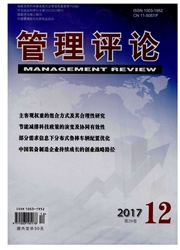

 中文摘要:
中文摘要:
以金融契约理论为基础,从控制权视角考察了企业"核心控制权"、"一般控制权"和"现金流权"的交互关系及其对过度投资的影响效应,并利用中国上市公司数据进行实证检验。研究发现:(1)管理者利用控制权地位攫取私利是引发企业过度投资的主要诱因,随着管理者控制权强度增加,过度投资水平明显上升;(2)投资者拥有的核心控制权能够对管理者一般控制权行使产生有效约束,相比较于股权分散、负债较少的企业,股权集中、负债较多企业投资者拥有的核心控制权更集中、干预动机更强,因而企业过度投资水平明显降低。
 英文摘要:
英文摘要:
Based on financial contract theory,we investigate the interactive allocation of "core control right","general control right" and "cash right" and their impacts on overinvestment,and then make an empirical test using the data from listed Chinese companies.The results show that,internal managers practice overinvestment so as to extract private benefits of control and the relationship between overinvestment level and control rights owned by managers is significantly positive.What's more,with the decrease of debt ratio and ownership concentration,overinvestment resulting from manager control is much more serious.
 同期刊论文项目
同期刊论文项目
 同项目期刊论文
同项目期刊论文
 Financial relationships, banking structure and financing constraints: evidence from private enterpri
Financial relationships, banking structure and financing constraints: evidence from private enterpri 期刊信息
期刊信息
